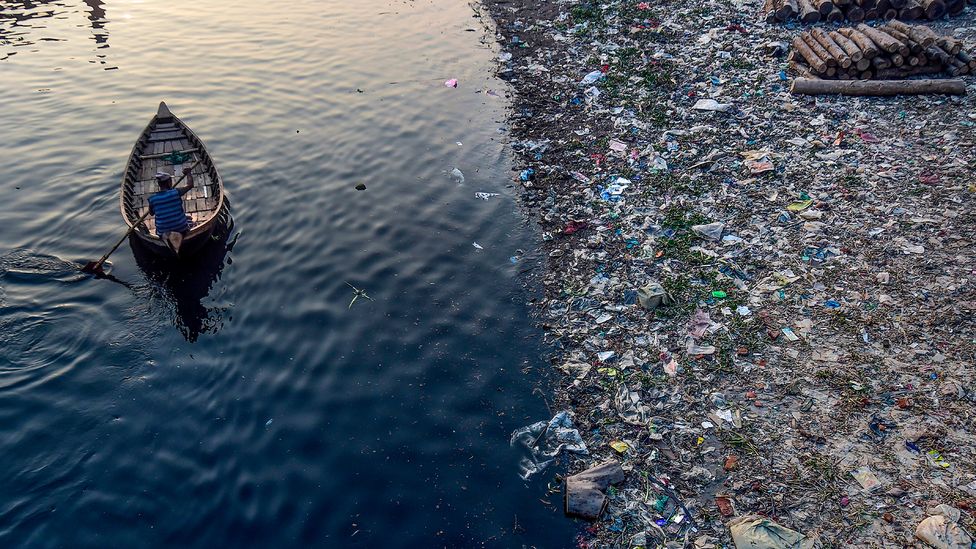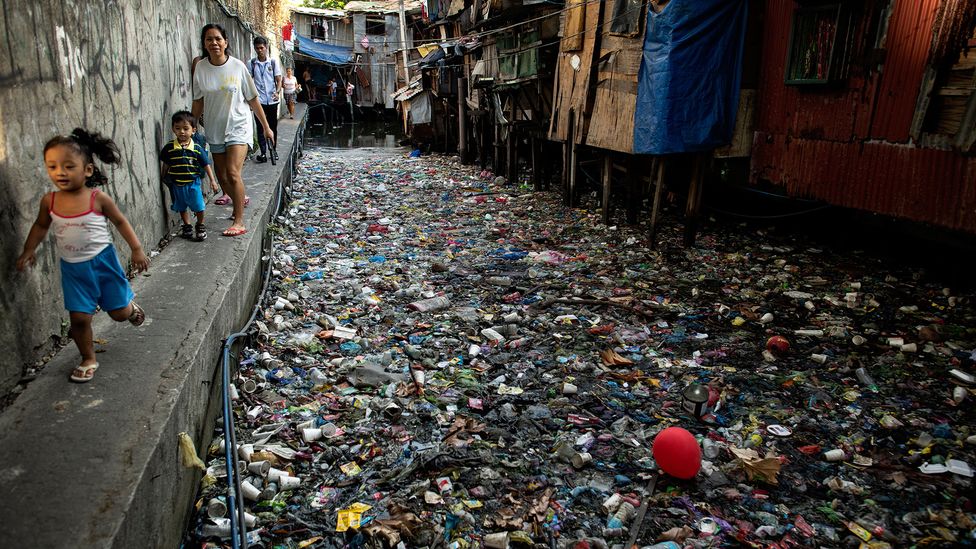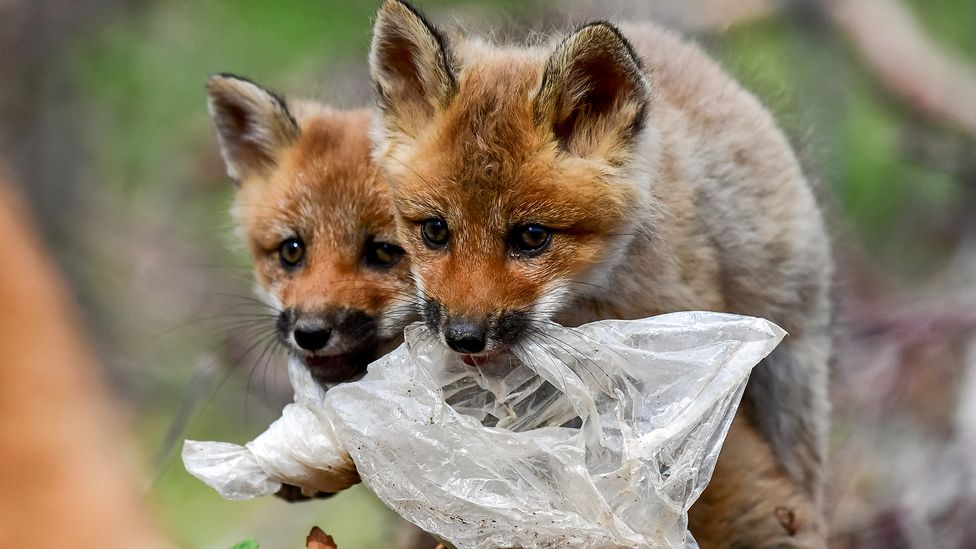How Long Does Humanity Have Left On Earth
Could humans really destroy all life on Globe?
(Image credit:
Josua Marunduh/Getty Images
)

The seemingly clamorous human trend to consume is changing our planet and the life on it, but can nosotros change our behaviour?
A
Amongst the many global catastrophic risks known to humans, some are entertained in the media more than than the others. Asteroid impacts, supervolcano eruptions and climate change have all received the Hollywood handling. And each of these accept taken a devastating toll on our planet's life in the past. Yet, unknown to many people, a new global threat capable of destroying life itself is brewing in the shadows of our everyday lives. It's driven by the immense human being desire for material consumption. And paradoxically it is a result of human being life itself.
But look around – you are inseparably surrounded by material objects – whether they are needed in your life or non. For every chip of this material we apply, in that location is a growing web of global actions that is slowly stripping homo'due south emotional health, depleting Earth's resource and degrading our planet's habitats. If left unchecked, is at that place a risk that human consumption may finally turn the Earth into an uninhabitable world? Practise nosotros have it in us to finish before it is too belatedly?
A team of researchers from Weizmann Establish of Sciences, State of israel, recently published a study that compared human-made mass – aka anthropogenic mass – with all the living mass, or biomass, on the world. They revealed that for the start time in man history the erstwhile has either surpassed the latter or is close to doing so in coming years.
The Weizmann Institute study estimates that on average, each person on the globe at present produces more anthropogenic mass than his or her bodyweight every calendar week. "The finding that anthropogenic mass – homo made stuff - now weighs as much as all living things, and the fact that information technology keeps accumulating rapidly, gives another articulate perspective on how humanity is now a major player in shaping the confront of the planet," says Professor Ron Milo, whose laboratory conducted this study. "Life on Globe is afflicted in a major quantitative fashion by the deportment of humans."

Our species is creating then much material that information technology encroaches on the space of other creatures (Credit: Munir Uz Zaman/AFP/Getty Images)
This revelation comes as no surprise to many who consider that humans take already ushered in a new geological epoch called the Anthropocene – the age of humans, a term popularised by Nobel Laureate and pharmacist Paul Crutzen. While the exact offset of this era is debatable, there is no denying that humans take go a dominant strength on this planet, altering every other form of life through our actions.
The scale and size of the anthropogenic affair is alarming. Take the example of plastic – the birth of the mod plastics era came just in 1907, but today we produce 300 million tons of plastics every year. Further, the realisation that after h2o, concrete is the about widely used substance on World is beyond comprehension.
The massive geoengineering process initiated by humans took an accelerated upswing when materials like physical and aggregates became widely bachelor. These two materials make up a major component of the growth in anthropogenic mass. Even the relatively contempo human adventures of space exploration, which began most 60 years ago, is triggering a disastrous space junk trouble. Alongside this nosotros haphazardly observe polar cap melts, permafrost thaws, and global temperatures getting hotter.
You might also like to read:
- How our cities will fossilise
- Are we living at the hinge of history?
- How weird could life get on Earth?
So, why has this happened? Are humans genetically inclined to be materialistic to the point of our own destruction? Is the accumulation of anthropogenic thing merely a measure of humans' annihilation rate? Or volition nature equip humans to cope with this problem? These are highly unsettled questions.
Although there is show that materialism is learned and shaped past civilization, there are some who argue that natural selection may have predisposed our species with a desire to accumulate stuff. Our belongings can offering us a sense of security and status that doubtless played a more important role earlier in human history.
Somehow, creating new stuff has become a divine word in the collective human psyche. It's obnoxiously seated in all our endeavours from ancient stories to modern inquiry and development rooms. "In the start God created the heaven and the Earth…" goes the Genesis story in Bible. Humans have been conditioned to believe that creating something new is a meaningful purpose of life and is the only mode to advance their ambitions. Even so we forget to put a cap on the use.
The limits of science accept never been more glaringly apparent when trying to solve this conundrum. Reliance upon greenish technological solutions alone is flawed considering the focus is still based on new stuff and more than use – not to change lifestyles or business concern models that handed us this problem in the beginning identify. Even if we can replace all fossil fuel-based vehicles with electric ones, for example, cities are already struggling to accept road space from cars and electric vehicles take their own footprint on the earth's resources due to the materials needed to build them.
"The accumulation of anthropogenic mass also relates to urban development, along with its associated ecology implications, already witnessed worldwide," says Emily Elhacham, 1 of the authors of the Weizmann Institute of Sciences study. "I hope that raising awareness would promote behavioral change that would enable finding a better residue point. Every stride in this management volition have a positive event."
Look at the carbon footprint of our gadgets, the internet and the systems supporting. Information technology accounts for nearly 3.7% of global greenhouse emissions, and is predicted to double by 2025. It's possible to cut down emissions with 1 less email or avoiding an unnecessary photo sharing on social media – it may seem like an insignificant reduction from one individual only then add billions of such small actions together. (Read more about the impact of our net activity on the climate.)
Big technology companies claim they are going green or ready goals for carbon neutrality but they rarely encourage people to spend less time on social media or gild fewer products. Rather advertising and marketing models convey powerful messages that reinforce the motto: create and consume more.

In amidst the rubbish we throw away, some species are evolving to thrive in the polluted environments we are creating (Credit: Noel Celis/AFP/Getty Images)
This irrational savage materialism is ingrained so securely with traditions and cultural symbols likewise. In the United States, Thanksgiving is followed past another carnival called Blackness Friday. During this ritual, long lines of customers hit the malls and often get injured or trampled – but people are convinced that it's an effort worth the trouble.
In the age of Anthropocene, humans may feel entitled to pivot promise on engineering science to fix any issues so that they can continue to do what they are doing. Faced with the accumulation of long-lived plastic in the environment, for case, a spurt of innovation led to biodegradable coffee cups, numberless for life and reusable straws. Merely while information technology is truthful that a sustainable growth model that includes our environs has much larger potential to persist, nosotros demand a different approach to sustainability that addresses our massive consumerism.
The Covid-19 has reminded united states how fragile and unprepared human civilisation is when it comes to even known knowns like a pandemic. It has also taught us that human behaviour can be modified with small-scale deportment like wearing mask to mitigate the intensity of global tragedies. The passive approach to proliferation of anthropogenic mass is not merely due to the lack of knowledge about its impact, but in full general, information technology has besides to exercise with human inclination to dismiss facts that don't fit their worldview. Humans are naturally disposed to disregard issues that are not challenging their daily lives or those which dilute their convenience.
Additionally, humans might notice the solace in the thought that nature might equip organisms to survive, no thing what nosotros do. It is true that the slow and gradual, Darwinian-fashion evolution through natural pick is often overtaken in certain extremely polluted environments. In 2016, a team of scientists in Japan found a strain of bacteria from bottle recycling facility that tin break down and metabolise plastic. On the other paw, this finding shows the subtle and powerful ways in which man deportment are changing the life on this planet.
The adaptation of organisms in response to pollutants is a complex phenomenon. "In the long term, a sustained increment of anthropogenic mass would pb to the loss of habitats through concrete dislocation and alteration of habitats such as contamination with pollutants resulting from the production and disposal of anthropogenic mass," says Alessandra Loria, a biologist at McGill University, Canada, who is the lead author of this study. Inquiry indicates that negative furnishings induced past pollution often worsen over multiple generations, although the coping mechanism vary in different species.
The rapid depletion of natural resource and biodiversity is non a normal evolutionary race that nature is used to. While some species can certainly adapt to the changes taking place in our environment, humans are no longer a mere species that follows Darwinian evolution merely a much larger force that has come up to drive evolution on this planet.
Studies have shown that for most species, evolutionary accommodation is not expected to be sufficiently rapid to buffer the effects of environmental changes being wrought by human action. And our own species will be no exception to this.
While there is no proof that we will destroy ourselves, in that location are clear indications that we ignore the effects at our own peril. For example, some of the mass extinctions in the Earth'due south history are related to acidification of oceans. The oceans absorb about 30% of the carbon dioxide released into the temper, which in turn increases the bounding main acidity. The oceans may exist acidifying faster today than they did in the last 300 million years, primarily due to human activities.

Can the species we share the planet with adapt fast enough to cope with the new world nosotros are creating for them? (Credit: Yuri Smityuk/TASS/Getty Images)
"Man life will be negatively affected because of the loss of the many ecosystem benefits and services provided by biological variety," says Loria. "For instance, water pollution may bear upon provisioning services, such as food and water, by causing a reduction in food variety and/or in its quality and safety. Widespread deposition of ecosystems threatens the conditions of life on Earth, in item the long-term survival of our own species."
Our impact on the planet is much is deeper than carbon footprints or global warming. Information technology points to a future where the effects of anthropogenic affair will have over – if information technology hasn't already – the identity of the World and its life. In the face of this, humans themselves might lose out in the evolutionary race.
Eliminating materials like concrete or plastic or replacing them with alternatives is not going to address the central problem with human attitudes and our unparalleled ambition for more. This is exactly where materialism can seamlessly transform into a known unknown hazard cistron in global catastrophe. The myriad of ways in which it can plough this planet into a mundane world is something our civilisation has never experienced earlier.
In the absenteeism of a fully secure evolutionary shield, we could depend on our intelligence to survive. Nevertheless, equally Abraham Loeb, professor of science at Harvard University and an astronomer who is searching for dead cosmic civilisations puts it, "the mark of intelligence is the ability to promote a better future".
"If we go on to behave this manner, nosotros might non survive very long," he says. "On the other hand, our actions could be a source of pride for our descendants if they sustain a civilisation intelligent enough to endure for many centuries to come."
The story of Bhasmasura in Hindu Mythology offers an eerie parallel to the impact of materialism. As a devotee of Lord Shiva, he obtains a boon from Shiva, which empowers him to plough anyone into ashes with a mere bear upon on the caput. Immediately after gaining this magical ability, he tries to test it on Shiva himself. Shiva manages to escape, the story goes.
Only humans may non exist lucky enough to flee from their own deportment. Unless, we offer a dissimilar vision rooted in reduction of consumption, the flames of our own materialism might consume both the states and our Stake Bluish Dot.
* Santhosh Mathew is a professor of physics and astronomy Regis College, Greater Boston, and a science writer who has authored two books.
--
Join 1 million Future fans by liking the states on Facebook , or follow usa on Twitter or Instagram .
If you lot liked this story, sign up for the weekly bbc.com features newsletter , called "The Essential List". A handpicked selection of stories from BBC Time to come , Civilisation , Worklife , and Travel , delivered to your inbox every Friday.
How Long Does Humanity Have Left On Earth,
Source: https://www.bbc.com/future/article/20210520-could-humans-really-destroy-all-life-on-earth
Posted by: naborsbege1997.blogspot.com


0 Response to "How Long Does Humanity Have Left On Earth"
Post a Comment